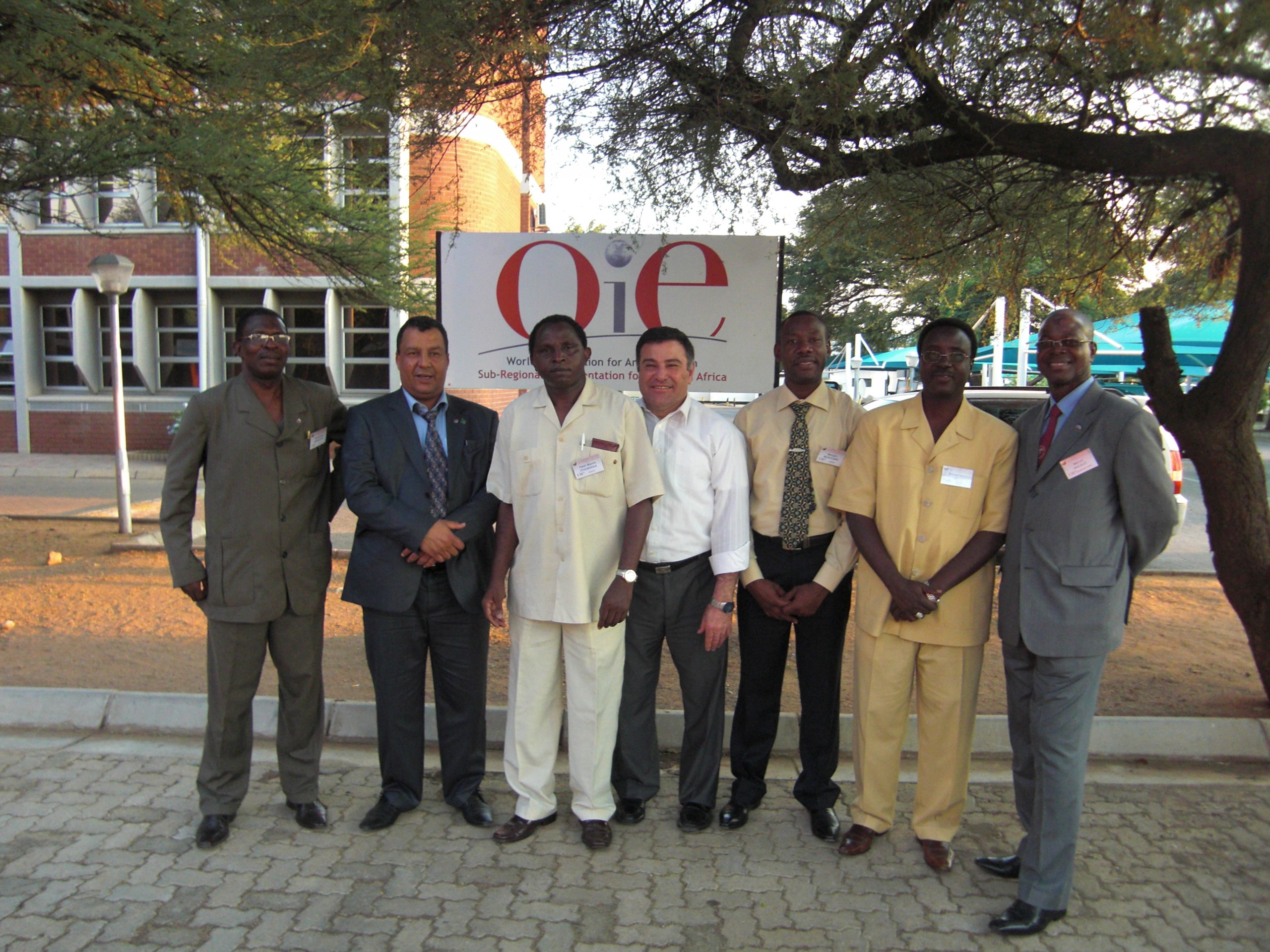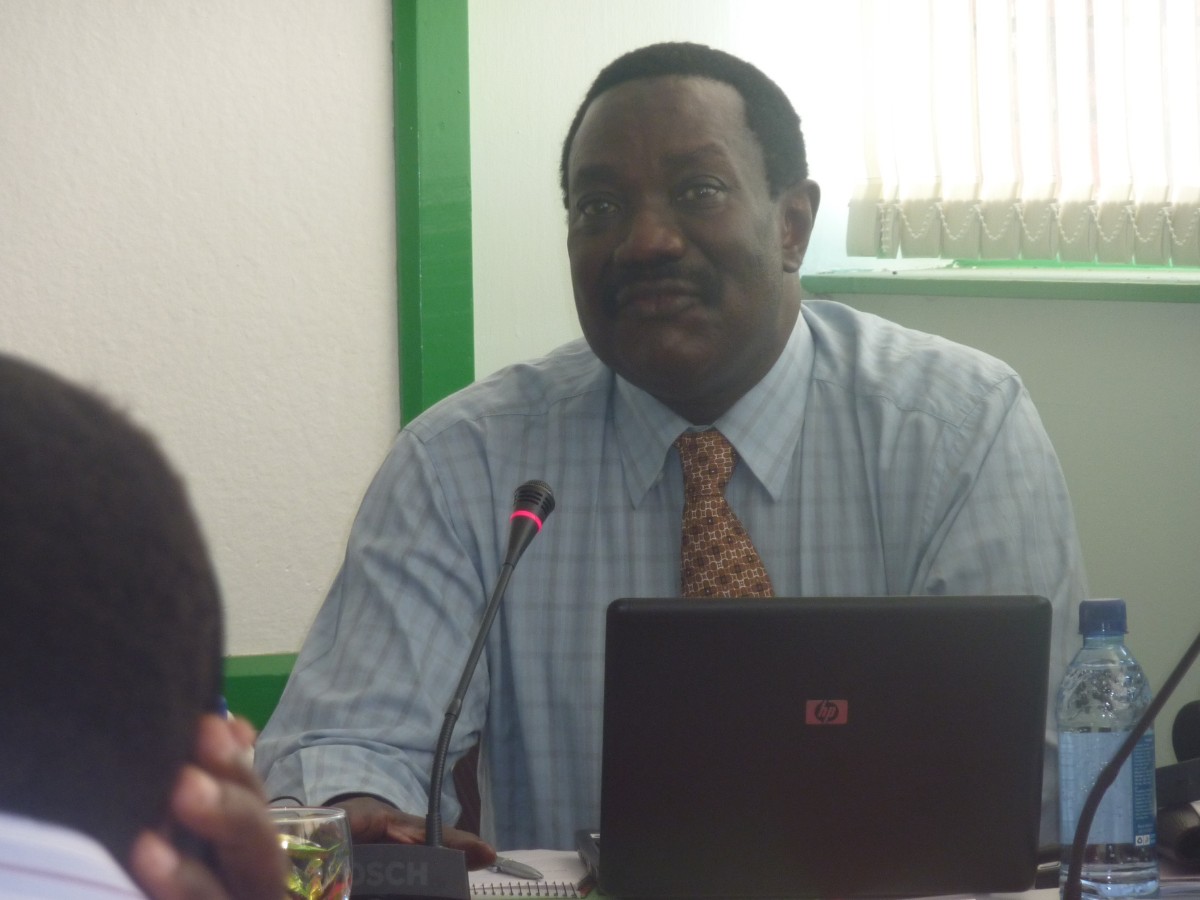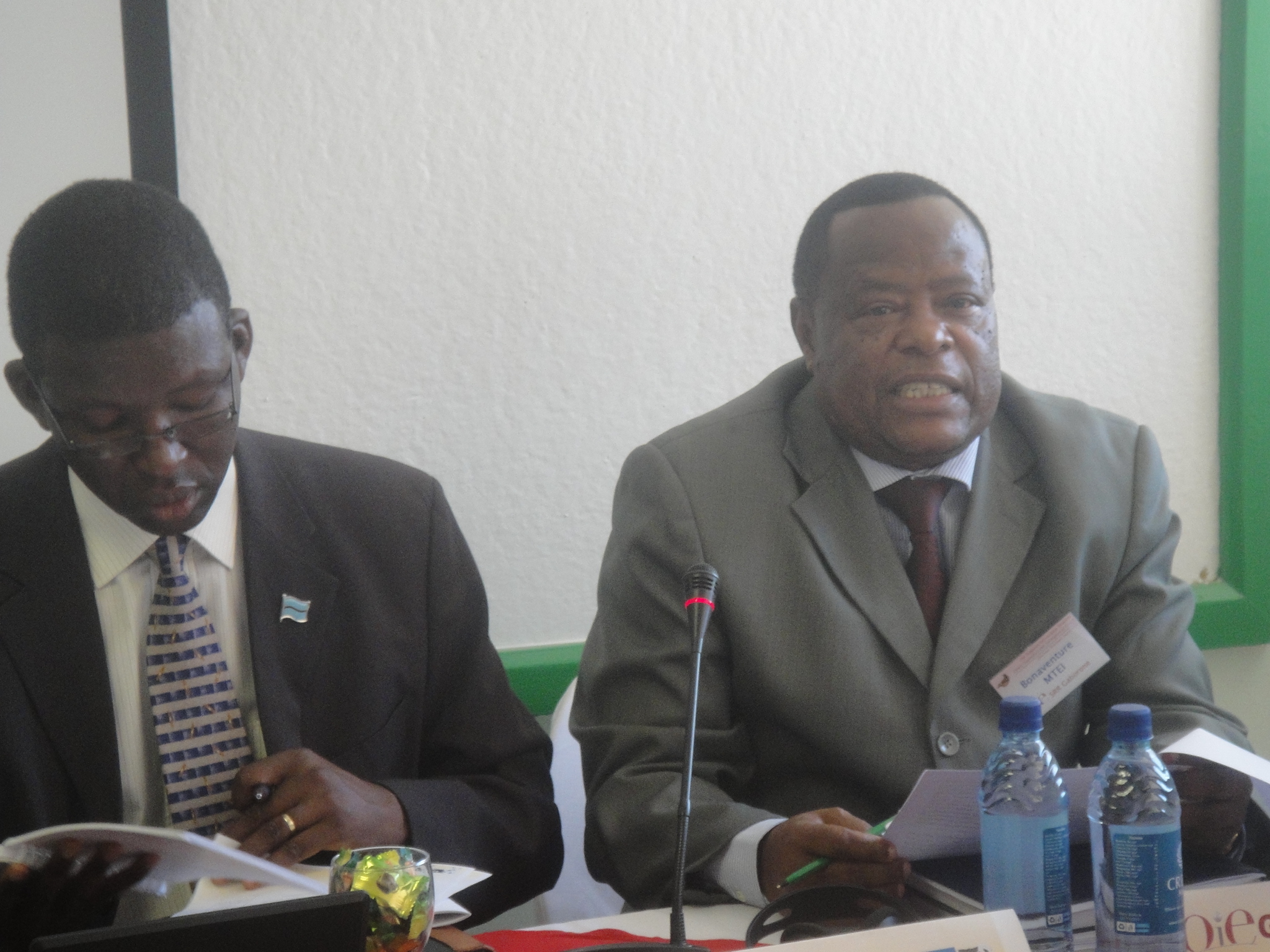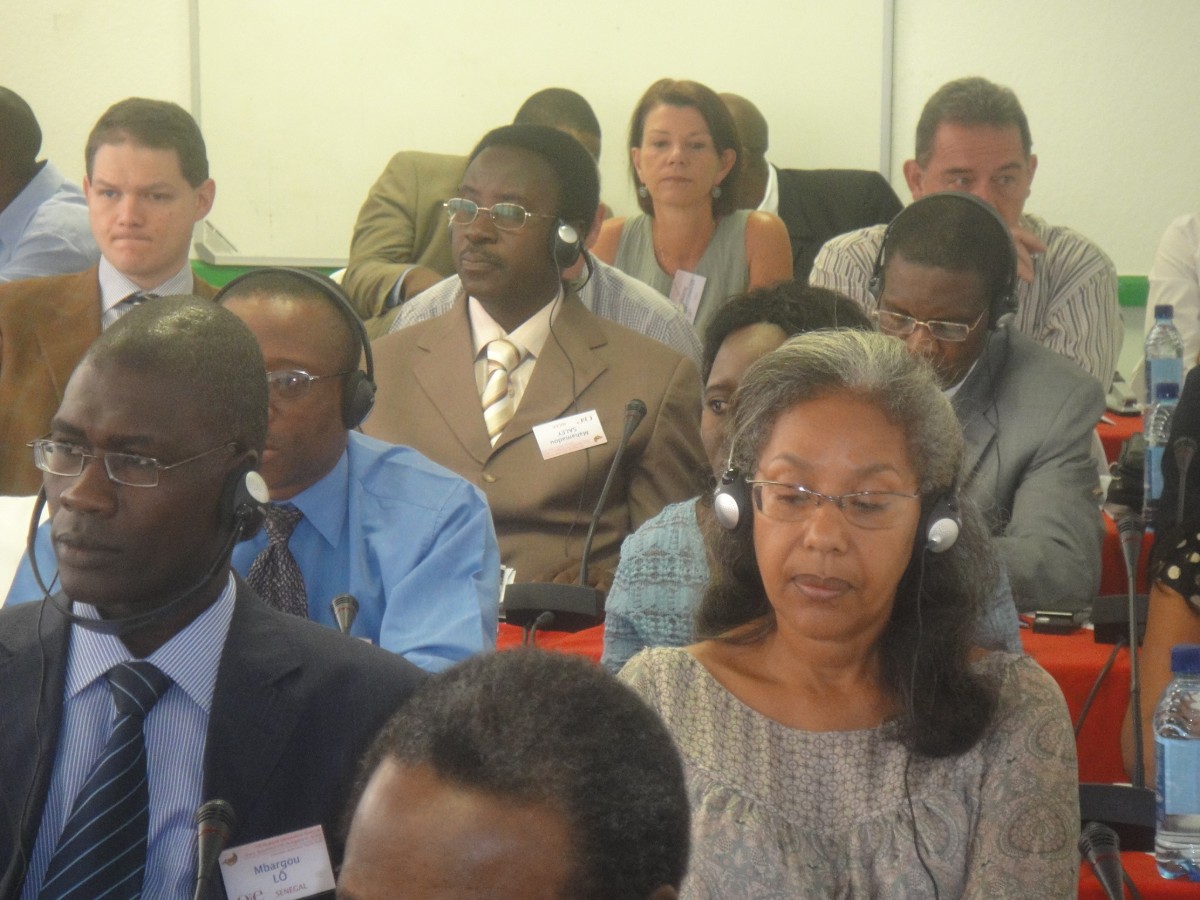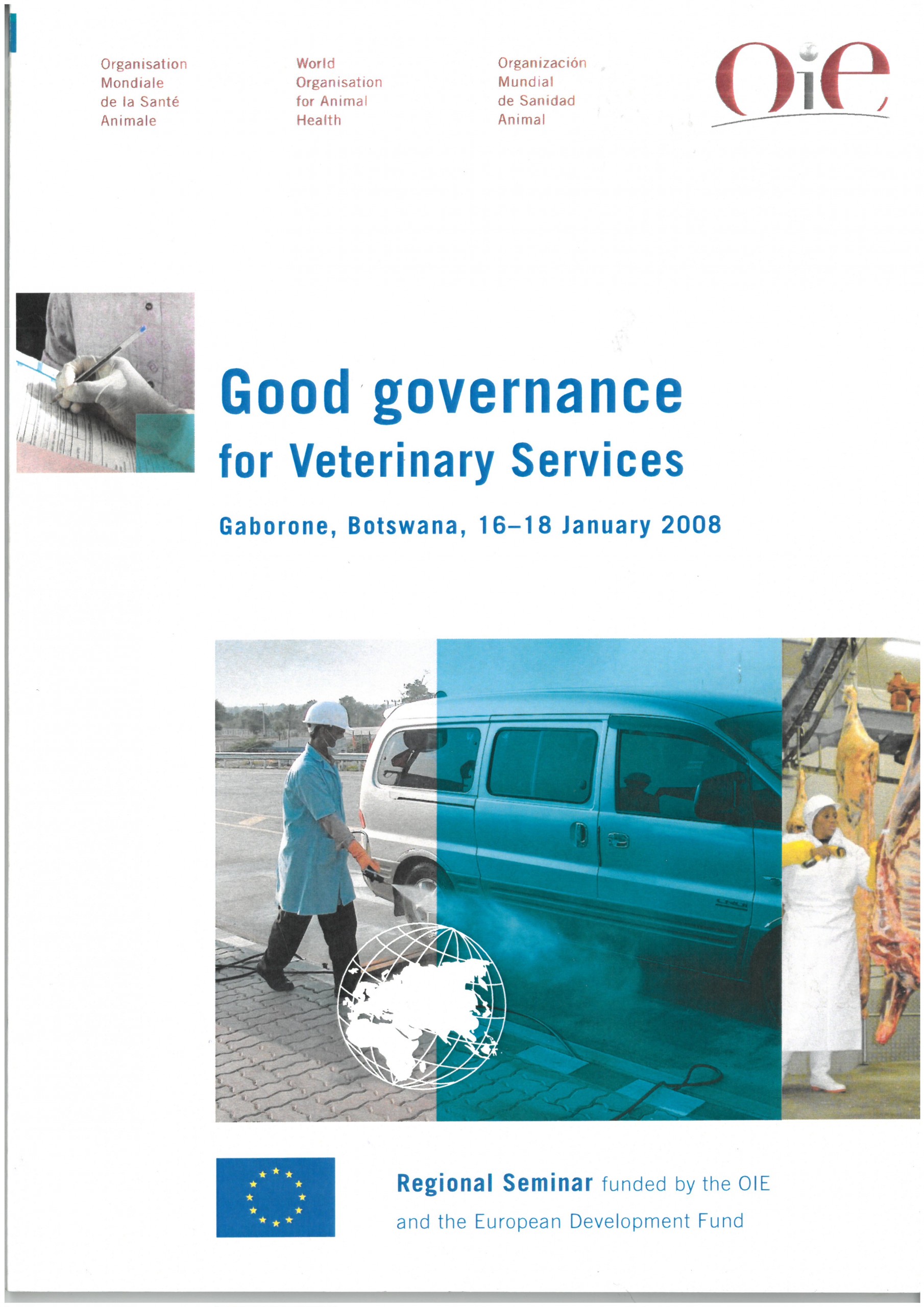
25 recently appointed OIE Delegates from African OIE member countries met in Gaborone, Botswana from March 9 – 12th, 2010 for a regional information seminar to improve their knowledge of the OIE and it’s activities. The seminar was facilitated by experts from within and outside the OIE and was complemented by field visits to the Botswana Meat Commission (BMC), Mokolodi Game Reserve and the Botswana Vaccine Institute (BVI).
The meeting covered the traditional mandates as well as the new mandates introduced in the 4th Strategic Plan and the forthcoming 5th Strategic Plan, such as animal welfare, legislation, communication, veterinary education, an so forth.
Dr. Abdoulaye Niang (RR Africa, Bamako) chairing. Picture (c) B.J. Mtei (oie) 2010.
The meeting was attended by OIE Delegates (or their deputies) from Angola, Botswana, Burkina Faso, Cameroon, Cape Verde, Central African Republic, Comoros, Gabon, Gambia, Ghana, Kenya, Libya, Madagascar, Malawi, Mali, Namibia, Niger, Nigeria, São Tome & Principe, Senegal, Sierra Leone, Sudan, Swaziland, Tanzania and Togo. The meeting was also attended by all 4 (sub)Regional Representatives of the OIE in Africa, based in Bamako, Gaborone, Tunis and Nairobi.
Opening address
Guest of Honour,
Colleagues, OIE Delegates,
Ladies and Gentlemen,
On behalf of Dr Bernard Vallat, the Director General of the World Organisation for Animal Health (OIE) and on my own behalf may I join the OIE Delegate for Botswana, Dr Philemon Motsu to welcome you all to Gaborone, Botswana and in particular to this meeting. Thank you for coming.
Guest of Honour, I thank you for availing yourself to come and officiate at this meeting. We are most grateful to the Ministry of Agriculture of the Government of Botswana for agreeing to host this meeting and to facilitating the local participants who we see as future delegates and OIE experts in the making. In a very special way I would like to recognise the presence of all these OIE experts here with us today. These are the top Gurus of the OIE. It is a privilege to have Alex, Francesco, Gideon, Mara, Vincent and all the other speakers. Of course not to forget the OIE Leadership for Africa Drs Mukani, Niang, Faouzi and Mzee Masiga. We are sure to get the best out of you and I sincerely hope that you will enjoy your working visit to Botswana. I would also like to acknowledge the presence of Maria Lisa Santonocito representing the European Delegation here in Botswana. We very much appreciation financial support from the European Union for the OIE to organize this seminar through the Better Training for Safer Food (BTSF) programme.
Guest of honour, gathered here are newly appointed OIE Delegates who are in their official and legal status, the Chief Veterinary Officers (CVOs) or Directors of Veterinary Services (DVSs) in their respective countries. I will not go into details of OIE since that is the aim of this training seminar.
Ladies and gentlemen we are here to learn from the OIE experts the mandate and responsibilities of the OIE as the sole international standard setting body for animal health and welfare. We are also here to learn from each other’s experiences on how to improve OIE Delegate’s performance in executing their official duties as heads of their respective national veterinary services responsible for implementing the OIE standards.
When we read stories like ….”Livestock owners in Africa are taking animal health care into their own hands due to poor Veterinary Services” … we get worried. That is why OIE has embarked on a very ambitious programme to improve on the quality and good governance of veterinary services worldwide with particular focus on Africa. OIE’s strongly believes that improving quality and good governance of national veterinary services is a significant value addition to the past emphasis on enhancing VS capacities to comply and participate in the standard setting mechanisms of the OIE. Implementation of this programme needs improved skills on leadership, organisation and management on the part of the OIE Delegates.
As you are all OIE Delegates from Africa, let me take the liberty to impress on you the need for us to reflect on the future of OIE activities in this continent. You may recall that the OIE has already celebrated 85 years since it was established. Some African counties namely Egypt, Morocco and Tunisia were amongst the first 25 countries in the world to sign the International Agreement on the 25th January 1924 in Paris, later joined by Madagascar, Mauritius, Somalia and Ivory Coast.
Soon after independence each of the African States joined the OIE and now we are proud of a strong Team of 51 African Delegates to the OIE World Assembly. What does this mean for Africa? It means a powerful democratic force to reckon with not only in terms of OIE standards setting but also in providing strategic guidance to the leadership, management and organisation of the OIE and in particular with reference to the African Continent. There is no doubt that the OIE has performed extremely well in Africa especially in recent years. The establishment of the OIE Regional Representation for Africa (OIE RR) in Mali in the year 2000 subsequently followed by the OIE Sub Regional Representations (OIE SRRs) in Gaborone in 2005, Tunis in 2009, and now 2010 in Nairobi, is a clear indication of OIE’s commitment and in particular that of Dr Bernard Vallat to Africa. But let us pose here and ask ourselves…….What is Africa doing to sustain OIE actions in the continent? Yes African States are paying their annual membership contributions and then what?
OIE Representations in Africa are currently operational thanks to voluntary contributions from the European Union, WAHWF, France, Spain and Italy etc with minimum extra contributions from the host countries Mali, Botswana, Tunisia and Kenya. If we really need OIE in Africa, then why can’t AU Member States fund OIE interventions in the continent from own resources? We are talking here of countries with huge terrestrial and aquatic animal resources like Sudan, Ethiopia, Republic of South Africa, Egypt, Nigeria, United Republic of Tanzania, Tunisia, Libya, Kenya, Botswana, Namibia and Uganda to mention a few. Surely something has to be done. If I may ask: is our political leadership and in particular at the level of Ministers responsible for Livestock and Heads of States in Africa aware of this problem? Something has to be done to convince AU Member States at the highest decision making level to contribute to OIE Actions in Africa as part of the 3% of the 10% NGDPs which was agreed by the Heads of States in Maputo (2004) to be allocated to Agriculture.
As CVOs from Africa you will be meeting in Entebbe, Uganda first week of May 2010, prior to the Conference of Ministers responsible for Livestock organised by the AU-IBAR. May I ask you and the leadership of OIE in Africa : what message are we taking to Entebbe with respect to Africa complying with OIE international standards on animal health and welfare as a prerequisite for trade in animals and animal products?
It has to be business unusual to get us out of this dilemma of OIE Actions in Africa depending on foreign well wishers whose support I am in no way underrating.
Guest of Honour, I thought I should get it out of my chest and bring it to the attention of this august meeting hoping that the knowledge these OIE Delegates will be sharing and acquiring from the OIE experts here present will provoke them to see the future development of OIE Actions in Africa in a more positive approach with regards to the use of own resources from the continent.
Yes it can be done, we only have to play our part.
I wish you fruitful deliberations and thank you all for your attention.
Ke a leboga
All pictures (c) P. Bastiaensen, V. Brioudes and B. J. Mtei (oie) 2010
